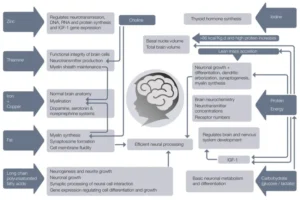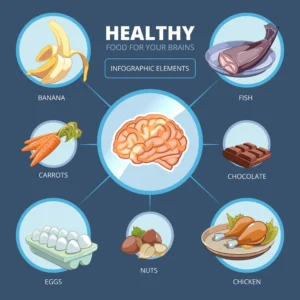Raising a 5-year-old is a whirlwind of curiosity, boundless energy, and constant learning. At this age, children are stepping into school life more independently, building friendships, and beginning to develop a stronger sense of self. For parents, creating a daily routine for 5-year-old children can feel both necessary and challenging. But here’s the truth: routines don’t just bring order....
Essential Nutrients for Baby Brain Development: What Every Parent Should Know
As a parent, you’re constantly thinking about your baby’s well-being, and their brain development is at the top of that list. The first few years of life are a critical period for cognitive growth, with trillions of neural connections forming. What your baby eats during this time directly impacts their brain’s structure and function. This is why understanding which brain food for kids is most beneficial for their brain development is so important.
This guide will walk you through the essential nutrients needed for healthy brain development and the best foods to include in your little one’s diet to help them reach their full potential.
Why Does Early Brain Development Matter?
The first 1,000 days of life, from conception to age two, are critical for brain growth. During this time, billions of neurons form connections that shape learning, memory, and emotional control. Proper nutrition fuels these processes and prevents long-term developmental delays.
How Does Nutrition Help Cognitive Growth?
Brain cells need nutrients to create neurotransmitters, strengthen synapses, and protect against oxidative stress. Diets rich in healthy fats, proteins, and vitamins improve attention span, problem-solving, and learning speed. That’s why brain food for kids is one of the most important parts of early parenting.

Which Nutrients Are Best for Baby Brain Development?
Here are the most important nutrients for your baby’s brain growth, along with their roles and sources:
-
Omega-3 Fatty Acids (DHA) – The Memory Booster
- Role: Builds brain cell membranes, supports vision and learning.
- Sources: Salmon, sardines, flaxseeds, walnuts, chia seeds.
-
Choline – The Learning Nutrient
- Role: Helps form brain cells and improve memory function.
- Sources: Eggs, chicken, soybeans.
-
Iron – The Energy Carrier
- Role: Transports oxygen to brain cells; improves focus.
- Sources: Lean red meat, lentils, spinach, fortified cereals.
-
Iodine – The Hormone Helper
- Role: Supports thyroid hormone production for brain growth.
- Sources: Iodized salt, seaweed, yogurt.
-
Zinc – The Memory Maker
- Role: Aids in brain signaling and learning capacity.
- Sources: Pumpkin seeds, beef, chickpeas.
-
B Vitamins (B6, B12, Folate) – The Brain Energizers
- Role: Aid neurotransmitter production and DNA synthesis.
- Sources: Whole grains, leafy greens, eggs, dairy.
-
Vitamin D – The Growth Protector
- Role: Supports brain cell development and immune defense.
- Sources: Sunlight, fortified milk, salmon.
-
Proteins – The Builder
- Role: Provide amino acids for neurotransmitter creation.
- Sources: Poultry, beans, tofu, yogurt.
-
Antioxidants (Vitamins C and E) – The Brain Shield
- Role: Protects brain cells from damage.
- Sources: Berries, citrus fruits, almonds.

What Foods Are Rich in Brain-Boosting Nutrients?
| Nutrient | Food Sources |
| Omega-3 | Salmon, walnuts, flaxseeds |
| Choline | Eggs, chicken, soybeans |
| Iron | Spinach, red meat, and lentils |
| Iodine | Yogurt, iodized salt, seaweed |
| Zinc | Pumpkin seeds, chickpeas |
| Vitamin D | Fortified milk, tuna, sunlight |
| B Vitamins | Whole grains, leafy greens |
| Protein | Poultry, beans, yogurt |
| Antioxidants | Berries, citrus fruits, almonds |
Pairing these foods with engaging activities can further strengthen your child’s cognitive growth.
What Are the Signs of Nutrient Deficiency in Babies?
Signs include slow weight gain, fatigue, poor concentration, frequent illnesses, pale skin, or delayed speech. If you notice these, see a pediatrician.
Tips for Parents to Boost Brain Development
- Introduce new brain foods one at a time for easier acceptance.
- Blend veggies into soups or purees for picky eaters.
- Keep snacks healthy, avoid processed high-sugar foods.
- Rotate nutrient sources to ensure variety.
- Breast milk or formula remains key in the first year.
FAQs
- What is the number one brain food for babies?
Salmon tops the list due to its high DHA content, which supports memory and learning.
- Are eggs safe for infants?
Yes, eggs are safe after 6 months (with pediatric approval) and are rich in choline for brain development.
- Can diet improve my child’s IQ?
While genetics plays a role, nutrient-rich diets can improve attention span, memory, and learning potential.
- Which fruits help brain growth?
Berries, oranges, and bananas are rich in antioxidants and vitamins that protect brain cells.
- How often should I give brain foods?
Aim to include at least one brain food in every meal or snack.
Conclusion
Nurturing your child’s brain is one of the most important jobs you have as a parent, and nutrition is a foundational part of that process. By focusing on a diet rich in key nutrients like Omega-3s, iron, and choline, you can provide your little one with the best possible start in life. Remember that feeding your child is an act of love, and every healthy meal is an investment in their bright future.

